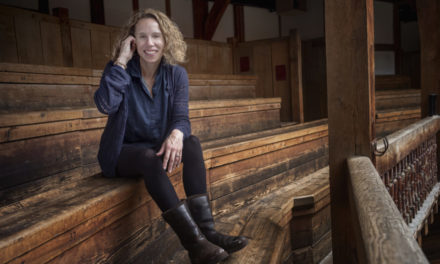In Theater for Living, brutal honesty about the hardships of life onstage is winning over fans.
“To earn, or not to earn? That is the question.”
From its opening line, a new Chinese reality show dives headlong into the harsh realities of the domestic theater industry — a widely underappreciated sector that suffers from poor funding, high costs, and pitifully low pay. Entering the industry often means pursuing passion over profit.
Since premiering on Jan. 16, Theater for Living has received sky-high reviews for its authenticity and originality in a TV genre awash with highly scripted copycat productions, sparking hopes that it might help revive interest in an art form with a long history in China.
In the show, eight highly accomplished — though hardly famous — male theater industry professionals are dropped into a drab “Theater Commune” on the outskirts of Wuzhen, an ancient river town in the eastern Zhejiang province known for its annual theater festival.
Over several weeks, the gaggle of eccentric and often comical thespians and directors live, sleep, cook, rehearse, and perform together as they assemble just enough drama productions to cover their collective food and rent costs.
Their first-episode task is to craft a family-friendly play supposedly for the owner of a local chicken farm in just three days. This will give them their first lump sum toward future productions.
The resulting performance ends up being a 20-minute tear-jerker about Xiaolan, a young chicken who says no to a life of slavish egg-laying and bravely leaves behind family and friends on a quest to see the ocean. The show includes hastily made props and live guitar-and-vocal musical backing.

A screenshot from the hit reality TV show Theater for Living, 2021. PC: iQiyi.
The difficulty of doing theater in modern China is a common theme throughout the series. The troupe soon discovers that tourists in Wuzhen are only willing to pay 10 yuan ($1.55) for play tickets, and members even end up busking in the street in a desperate bid to make ends meet.
At one point, the men discuss whether it’s actually possible to survive on income from theater alone. “I used to get 50 yuan for each day’s rehearsal. That can’t possibly count as ‘making money,’ because it’s not enough to buy a day’s worth of food,” says one of the more junior members. Another reveals that after decades of making shows, he has only managed to amass a paltry 20,000 yuan in savings.
The contestants are all too aware of how Theater for Living might change perceptions. In the show’s first episode, when some members of the troupe aren’t taking their task seriously on the pretext that they’re just having fun on a reality TV show, cast member Wu Bi reminds them that the show presents a rare chance to promote their art form to a mass audience.
“If even just 10 more people…after watching this show could think, ‘Oh, this is interesting, I’d like to watch a drama,’” says Wu, “it would be hugely important for young people who are making dramas on the front line.”
So far, the show is a long way from being a viral hit due to its niche subject matter and lack of recognizable stars, but it has been extremely well-reviewed. On media review site Douban — where weak dramas are mercilessly slapped with harsh 2 or 3 out of 10 ratings — Theater for Living boasts an impressive 9.3 out of 10, a mark that continues to climb.
In on-screen bullet comments and reviews, many social media users said watching the show’s performances was the first time they’d ever understood what theater actually is, and they were surprised to find themselves moved to tears. They also said they were moved by the participants’ determination and passion.
A larger audience might yet materialize. The show has received increasing media and blogosphere coverage this week ahead of its fourth three-hour episode out of 10, which will broadcast Saturday evening on the Netflix-like Chinese video site iQiyi. And then there’s the budding star power of the show’s producer, Yan Min, renowned for earlier reality TV hits like Rap for Youth.
China’s modern theater industry has been slow to grow in recent years, says Wei Jiayi, a theater industry consultant. Many theatres are run by state-owned companies that, due to the ample fiscal support they receive, aren’t under pressure to produce competitive, cutting-edge shows. The extortionate cost of renting theaters and low general interest, meanwhile, make it difficult for private companies to produce profitable shows.

A GIF shows a participant on Theater for Living giving a dramatic performance. PC: @爱奇艺戏剧新生活 on Weibo.
For most Chinese, domestic theater shows are inaccessible — theaters tend to be concentrated in Shanghai and Beijing — as well as unaffordable, at 300 to 500 yuan per show. China’s rich theater tradition, from roving rural troupes to revolutionary plays, hasn’t carried over to the present day.
In recent years, the import of quality foreign productions — especially musicals such as Cats — has greatly boosted interest in theater in China, but the COVID-19 outbreak has now barred any such shows from entering the country, leaving local productions to hold the fort. Wei muses that the heaviness brought about by the virus is also making people more receptive to lighter media, such as stand-up comedy.
After half a year of closed doors due to COVID-19, theaters were eventually allowed to reopen, though the resurgence of the virus in recent weeks has led to more closures, and Beijing has again reduced theater seating capacity to 50%.
In this difficult time, Theater for Living was deliberately made with the aim of promoting Chinese theater, says drama consultant Wei, who is acquainted with all the participants and was invited to watch their final performance last week. The show was delayed for months because it struggled to find commercial sponsors, and it wouldn’t have happened without backing from Huang Lei, its celebrity host and the co-founder of the Wuzhen Theatre Festival.
What Theater for Living does right is portray the struggles of theater producers starting out in the industry, says Wei. It’s also an appealing way to spread the word about modern theater during COVID-19 — something that has proved elusive for industry professionals since theater shows lose most of their magic when digitized.
Wei is confident that interest in the theatre will grow, though he says it will take many years to develop a healthy ecosystem, and a single show shouldn’t be expected to kickstart an industry.
This article was originally posted on sixthtone.com on February 5, 2021, and has been reposted with permission. To read the original article, click here.
This post was written by the author in their personal capacity.The opinions expressed in this article are the author’s own and do not reflect the view of The Theatre Times, their staff or collaborators.
This post was written by Kenrick Davis.
The views expressed here belong to the author and do not necessarily reflect our views and opinions.


















